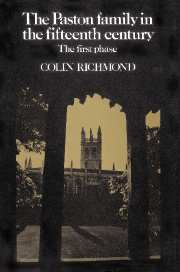Book contents
- Frontmatter
- Contents
- List of genealogical tables
- Preface
- Acknowledgements
- List of abbreviations
- Chronological table
- 1 The origins of the Pastons
- 2 Land: acquisition and defence
- 3 East Beckham
- 4 Three marriages
- 5 Relations: the Garneys and the Berneys
- 6 The deathbed of William Paston and its consequences
- 7 Sir John Fastolf and John Paston
- Conclusion
- Index
2 - Land: acquisition and defence
Published online by Cambridge University Press: 26 December 2009
- Frontmatter
- Contents
- List of genealogical tables
- Preface
- Acknowledgements
- List of abbreviations
- Chronological table
- 1 The origins of the Pastons
- 2 Land: acquisition and defence
- 3 East Beckham
- 4 Three marriages
- 5 Relations: the Garneys and the Berneys
- 6 The deathbed of William Paston and its consequences
- 7 Sir John Fastolf and John Paston
- Conclusion
- Index
Summary
What did William Paston do with the pounds his legal practice (purchased, so to speak, with Geoffrey Somerton's pennies) brought him? The short answer is that he bought land. The answer to the next question (why did he buy land?) is set out in a conversation between the Archdeacon of Barchester and Major Grantly:
‘I wonder people are so fond of land’, said the major.
‘It is a comfortable feeling to know that you stand on your own ground. Land is about the only thing that can't fly away. And then, you see, land gives so much more than the rent. It gives position and influence and political power, to say nothing about the game.’
The disadvantages of landowning in fifteenth-century England (on the other hand) are well known; they have been extensively studied: collecting rents and getting dependable farmers for demesne land was more difficult than at any time between the ninth and the nineteenth centuries. That these were stiff tasks which the landlord and his agents worried about and worked at is abundantly documented in the Paston letters: we have to be selective.
Sir John Heveningham's plaintive excuse for not helping out John Paston, ‘I have as moche as I may to gader myn owune lyfflode, and truli, cosyn, I can not gadere that well’, is perfectly illustrated for the Pastons themselves by the memorandum of 22 August 1477: ‘The names of the maners of Agnes Pastons and William Paston in Norfolk, how thai shulde be taken hede to this harvest anno xvij.’
- Type
- Chapter
- Information
- The Paston Family in the Fifteenth Century , pp. 23 - 63Publisher: Cambridge University PressPrint publication year: 1990



